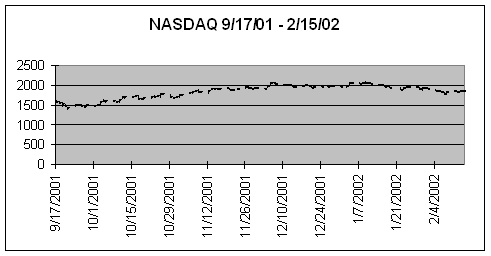Chapter 11 - Bear Hug, February 19 – 25, 2002 - episode 1
Listen to podcast

Media Contact:
Donna Langhorne
Chief Financial Officer
212 555 1000
donnal@hackoff.com
For Immediate Release
HACKOFF.COM ANNOUNCES FOURTH QUARTER AND ANNUAL RESULTS
February 19, 2002 — New York, NY — hackoff.com.® (NASDAQ: HOFC) had revenues of $3.35 million for the fourth quarter of 2001, a decrease of 72% from the revenues reported for the same quarter of 2000 and a sequential decrease of 33% from the third quarter of 2001.
The Company’s net loss for the fourth quarter of 2001 was $42 million. This compared to a net loss of $10 million for the fourth quarter of 2000 and a net loss for the third quarter of 2001 of $29.0 million.
The Company’s net loss per share was $1.13 for the fourth quarter of 2001 compared to a net loss per share of $0.26 for the fourth quarter of 2000 and a $0.78 net loss per share in the third quarter of 2001. The weighted average shares outstanding for the fourth quarter of 2001 were 37.2 million compared with 38.8 million for the fourth quarter of 2000 and 37.3 million for the third quarter of 2001.
The company had a cash-basis loss of $12.4 million in the fourth quarter of 2001 compared to a cash-basis loss $14.1 million in the fourth quarter of 2001 and a cash-basis loss of $13.2 million in the third quarter of 2001. Cash-basis profit and loss is calculated by subtracting sales paid in equity from reported sales and subtracting write offs of equity acquired in equity sales from total write offs.
During the fourth quarter of 2001 the Company had SG&A expense of $8.9 million. Of this amount, $.8 million were termination expenses related to reductions in headcount.
During the fourth quarter of 2001, the Company wrote down the value of portfolio stocks to the lesser of price at acquisition or the current ascertainable value of the equities. Equities for which no equity valuation was reasonably attainable were valued at zero. These write-downs and write-offs totaled $30.0 million for the quarter. This compared with similar write downs and write offs of $5.0 million for the fourth quarter of 2000 and $18.0 million for the third quarter of 2001.
The Company used $10.2 million in cash during the quarter compared with $12.4 million in the fourth quarter of 2000 and $10.9 million during the third quarter of 2001. The Company ended the quarter and year with over $26.8 million of cash and cash equivalents. Equities in the Company’s portfolio are currently valued at $8.1 million. The Company has no long-term debt.
During the quarter, the Company did not purchase any of its own shares and still has an outstanding authorization to purchase up to 1.2 million shares.
Full Year Results
Revenues for the year 2001 were $26.4 million, down 55% from $58.0 million in 2000. The Company’s net loss in 2001 was $106.8 million compared to a net loss of $18.0 million in 2000. For 2001, the Company’s net loss per share was $2.87 compared to a reported loss of $0.47 in 2000.
Other Recent News
- In Q401, hackoff introduced its Monitored hackaway Service®. This service provides hackoff customers with 24x7 active monitoring of their e-commerce sites by the experienced staff of the hackoff Network Operations Center (NOC). It is available for a variable monthly charge to licensees of hackaway software. A new Monitored hackaway Service logo has been developed to further distinguish those e-merchants who provide this extra level of protection to their users.
- During Q401, a majority of new hackaway licensees purchased their licenses under traditional 30 day net cash rather than equity payment terms. In all previous quarters, a majority of new customers have been on an equity rather than cash-basis.
- Significant new licensees announced during Q401 include leading bookseller iHudson.com, ibillpaynow.com, and cable giant Conphilia.
Chairman Lazard’s Comments
“No one can be happy about the size of the write-down and write-off we took. However, it is important to recognize that, although the Internet bubble has burst, the Internet has changed all of our lives forever. The share of the national economy devoted to e-commerce continues to grow and hackoff’s services are vital to the growth of e‑commerce.
“Despite the write-offs, we believe that we have more than ample assets to take us to the time when hackoff not only returns to profitability but also is cash-flow positive. We have over $26 million in cash and cash equivalents and, even after the write-offs and write-downs, our accountants and the Company agree that equity portfolio is accurately valued at an additional $8 million. Of course, there cannot be any assurance that there will not be further write-offs and or write-downs; on the other hand, a stock market recovery could make the equity portfolio more valuable than it is today.
“Because it is impossible to predict the future of the equity market, we are managing day-to-day as if our equity portfolio did not exist. We have reduced cash burn significantly from last year and even from last quarter. Part of this reduction is masked by the fact that we have one-time expenses for termination as part of these reductions so the full benefits of reduction don’t flow through immediately.
“Moreover, the majority of new licensees now pay us on a 30 day net cash-basis. Although these cash payments don’t have the upside of equity, they are better for our cash flow.
“Finally, our new Monitored hackaway Service should provide us with additional cash-flow. It is not being offered on an equity basis except to some customers whose contracts require us to offer them all services for equity. It requires monthly payments from many customers.”
Future Guidance
The Company believes:
- It has adequate resources to fund its ongoing operations until they are cash-flow positive without the need for an equity or debt offering or any other form of borrowing.
- The Company expects to return to profitability in 2002.
- The Company expects to become cash-flow positive in 2003.
Conference Call and Webcast
Hackoff.com Chairman and CEO Larry Lazard and Chief Financial Officer Donna Langhorne will host a conference call for interested press and industry analysts at 5:30 PM Eastern Time today (February 19, 2002). Shareholders and other members of the investing public are invited to listen via a webcast. The webcast can be accessed from the Company site at www.hackoff.com/webcast.
Questions may be submitted prior to and during the call to ir@hackoff.com. These will be answered on a time-available basis and may be combined, condensed, or otherwise edited by the Company at its sole discretion. All submitted questions become the property of hackoff.com.
The webcast will be archived and available for a period of time through the same web address.
###
It’s 5:00 PM on February 19, 2002. The hackoff.com earnings press release was put on the wire half-an-hour ago. Larry Lazard, Donna Langhorne, Aaron Smyth, and an admin whose black jeans have apparently been shrink‑wrapped onto her long, thin legs are all sitting around the Polycom speaker phone at Larry’s conference table. They are preparing for the 5:30 conference call with “industry analysts”, which will also be webcast, as advertised in the earnings release.
Actually, Donna has carefully supervised who has the call-in number and which requests to take part live in the conference call will be honored. She has, as always, encouraged the analysts who work for the brokerage firms and write about hackoff to participate. She includes analysts who don’t currently write about hackoff in the hope that they will. Companies are judged partly by how many analysts “cover” them. A company covered by few or no analysts gets less respect than one with good coverage. Individuals and funds are more likely to buy stock in firms they can get information about — though they say they no longer trust what analysts write.
Hackoff has been losing coverage. At its peak, it was covered by analysts from nine brokerage firms, most of them fairly respectable. But the brokerage firms themselves have lost most of their revenue since there are currently no IPOs and very little other financial activity in this scary post-bubble, post‑9/11 time. Analysts have been getting sacked, and only the major companies are reassigned to other analysts who complain about being overloaded (but not loudly).
Hackoff is not among the companies that get reassigned. Now only Barcourt & Brotherson, FCBC, and WSTUC cover the company. Barcourt & Brotherson and FCBC were both leaders of the syndicate that managed hackoff’s IPO. WSTUC was formed by a merger of a number of smaller firms including Web & Stinger, which was also part of hackoff’s IPO. WSTUC, especially, seems to be losing interest in hackoff, and Donna has made several calls and sent a storm of email to encourage them to call in for today’s conference.
Eve Gross has called her contacts in the financial press to get them to call in. She doesn’t think it likely that any will.
Donna has also called mutual fund managers like John Signal from Semper who still has his job. Tom Chen, hackoff’s original champion at Semper, lost his after the huge fund he managed lost seventy-five percent of its value during 2001 and wound up on the cover of Business Week pictured as a sinking ship. While about-to-be drowned investors clung to the swiftly submerging rigging, a particularly nasty cartoon image Tom Chen prepared his personal lifeboat.
Donna hopes there will be at least a few fund managers or large individual investors on the call, but isn’t sure there will be.
“Well, here goes nothing,” says Larry. “What are the chat groups saying about the release?”
“You don’t want to know,” says Aaron. “It won’t help. It’ll just piss you off.”
“Why? What’re they saying that’ll piss me off? What are you trying to protect me from?”
“I don’t know what they’re saying,” says Aaron. “I never look at them. I just know whatever they’re saying is worthless bullshit and sure to piss you off.”
“The hell you don’t look at them! The hell you don’t! Anyway, I need to know what they’re saying. They’re assholes, but if there are parts of the press release they consistently don’t understand, maybe it’s something we should clarify on the call.”
“You’re just going to get pissed off,” Aaron persists.
“Lar, you sure you want to do this?” asks Donna.
“You want me to print it out?” asks the admin.
“Good idea,” says Donna before Larry can answer. “Print it out just back to when the release hit the wire and bring us all copies. Beats staring at a screen. Thanks.”
When the admin leaves the room, Donna says: “Look, Lar, they aren’t going to like it.”
“We were honest. And we gave them constructive guidance,” objects Larry.
“We had a thirty million dollar write-off. The value of our portfolio is almost gone.”
“They had to know that was coming. That must already be in the price of the stock.”
“Trust me. They won’t like it and it doesn’t matter that they don’t like it. We had no choice but to report what we reported.”
“But we gave them guidance that the company’ll be fine,” insists Larry.
“If it were up to me, we wouldn’t have given them ANY guidance,” says Aaron. “It’s just evidence somebody’ll use in a stockholder suit against us.”
“The analysts don’t do projections any more because Reg FD doesn’t let us whisper secrets in their ears,” Larry says. “It’s not like the good old days when we ‘helped’ the analysts figure out the numbers and they made predictions. They’re too lazy to do any fucking work and the new regulations don’t let us do their work for them.”
SEC Reg FD — Regulation Fair Disclosure — went into effect in October of 2000. The proclaimed target of the regulation was the cozy relationship between company managers and security analysts at brokerage firms that clearly existed prior to the issuance of the regulation. These analysts were regularly briefed on a “confidential” basis by the company, and given a “heads-up” if there were significant changes from what they had been writing. It was just this sort of “heads-up” that hackoff gave analyst John Braxton at Barcourt & Brotherson when it looked like the second quarter of 2000 might be worse than anticipated.
Even under the law at the time, trading on insider information was illegal. However, it was a legal and common practice for companies to give this information confidentially to the analysts who covered them, as long as the company didn’t know the information was being used illegally. Each quarter companies like hackoff would hold a “confidential” call with the analysts who covered them prior to the release of earnings. The stated purpose of the call, whose contents the analysts were not supposed to reveal until after the company made a public release, was to allow the analysts to ask questions and have their commentary on the company ready to issue concurrent with the company’s results. What actually happened, as the SEC knew full well, was that analysts called their favored (read: “big”) clients with the information before the information reached the general public. This meant that the favored clients could buy or sell on the basis of this information before it became generally known and affected the price of the stock.
This practice, of course, affected the price of the stock.
This advance information not only endeared the analysts to their firms and the firms to their clients, it also was powerful leverage. In the unusually lucid words of the SEC: “Selective disclosure also may create conflicts of interests for securities analysts, who may have an incentive to avoid making negative statements about an issuer for fear of losing their access to selectively disclosed information.”
It was certainly not unheard of for company management to stop returning phone calls from analysts who wrote negative things about them. So Reg FD said, roughly, that top company management cannot make any significant non-public information selectively available to people such as security analysts or investors who may be able to trade or help others trade on the basis of that information. If a company has something significant to announce, it must do it in a public forum such as an SEC filing or a press release. In other words, no more private little chats with goodies for the analysts.
But now the analysts don’t know any more about the company than anyone else. In the jargon of the day, they have lost most of their “value add”. Why read what an analyst writes if the analyst doesn’t know anything that you don’t know? There is always the possibility that analysis is valuable because of the THOUGHT that went into it rather than the nonpublic material information, but nobody really believes that. Just one more reason there are fewer analysts available to cover companies like hackoff.
Ironically, the companies still want coverage because their investors still ask: “Who covers you?” though they profess to believe the analysts less than they ever did.
Now that management is no longer able to talk privately to them, analysts can’t begin to forecast for a company they never really understood and that has no real history, in an industry they don’t understand that has no history either.
“So,” Larry says, “since the fucking analysts can’t tell people what our earnings are going to be unless we whisper in their ears and the SEC says we can’t fucking whisper in their ears, there’s no fucking way for people to know what the company is going to do unless we tell them.”
“Larry, we don’t know either,” says Aaron. “We don’t know what the company’s going to do. We’ve always been wrong with our forecasts.”
“We’ve always told the truth,” says Larry. “We’ve always said what we thought the company was going to do. We’re not claiming to be fucking infallible.”
“Yeah,” grumbles Aaron. “I’m going to love defending this shareholder suit.”
The admin returns and gives them each a couple of pages of recent chat group effluvia to look at.
coming back later, set blookmark here | display next episode now »








